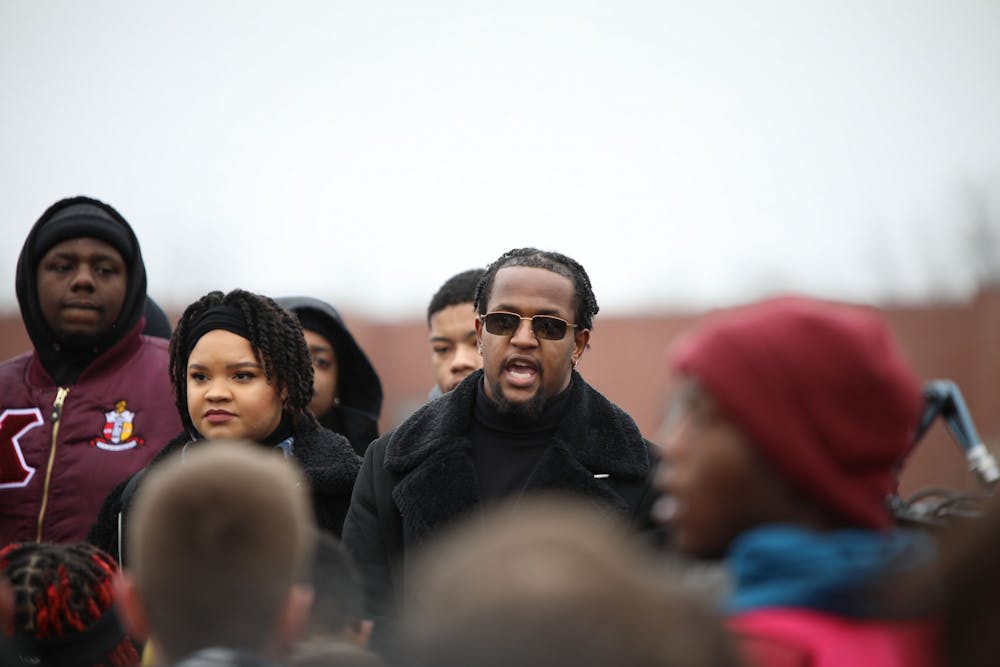
Zahria Hart is a freshman magazine journalism major and writes “Black Curtain” for The Ball State Daily News. Her views do not necessarily agree with those of the newspaper.
Being a black man in America has never been easy, and it probably never will. We constantly see our black brothers not being supported by the justice system, and in 2018, the Sentencing Project found that of U.S. residents born in 2001, one in three black men will face imprisonment at some point in their lives. We have gang violence ravaging our young men, and drugs ruling over their lives, with “nearly 80 [percent] of people in federal prison … [being] black or Latino” according to the Drug Policy Alliance.
These are some of the reasons why we encourage our black men and boys to stay in the classroom and to take advantage of their education.
But what happens when that classroom is no longer a safe zone? What happens when black men are met with the same scenarios as being on the streets? Sultan “Mufasa” Benson, a Ball State senior and business administration major was faced with that exact situation.
On January 21, a video showing the senior being asked to move to the front of the classroom by a campus officer began circulating on social media and around campus. Benson was originally asked by the marketing 310 professor, Shaheen Borna, to sit in the back of the class as his assigned classroom seat was already taken by another student.
Then, a student left and Borna asked Benson to move towards the front of the room. "Either you can move your seat, or I call the police," Benson said Borna told him.
Having the police called is something every black man fears, and though Benson was not physically harmed by this situation, he very well could have been.
“They don’t know what it’s like to be 6’1”, 270 [pounds] and dark-skinned,” Benson said.
All Benson wanted was to go to class and get an education, but this situation showed that even something as simple as that can be stressful for a black student.
Benson said as a Chicago native, Chicago was sometimes “scary,” and that he wanted to get away and explore so he could become “a better person.” Benson knew that college was the place where he could further his education, make connections and learn the insides of the business world.
And he does not want to just stop at college.
“I plan on starting a job and pursuing many business ventures that will be in support of my all-time goal of owning my own record label,” Benson said.
This is the life he wants for himself — in every way he is just like me as an African American woman, because I have a future for myself as well. I want to be a Ball State University graduate, end up as a writer in the New York scene, with a beautiful family with my well-educated first love.
But it seems like every time a person of color works toward their future, something comes in the way and shoves us down. They tell us education is the only way, and applaud us when we further our education, but turn the other way when they see us struggling with our finances, our life goals and everything in between.
Two campus police officers arrived after Borna called them, and asked if Benson had been “disruptive.” They got a resounding “no” from several of the other students.
Benson was simply following the powerpoint in the back of the room. Is that now a crime? What are we supposed to do when we can’t even get an education in peace while living in a world that tells us otherwise?
Since the incident last Tuesday, Borna has issued an apology specifically to Benson and the rest of that specific marketing 310 class. In both emails, Borna apologized for how he "mishandled" the situation. According to Borna, the university has requested that he decline media interviews.
In an email sent to the university, Ball State President Geoffrey Means said the situation had "unnecessarily escalated," and that he and the business school's dean had established corrective actions that included appropriate training and oversight for the professor in the future. Benson is also scheduled to meet with Mearns on Saturday.
"This choice was a gross error of judgment, and it was simply an unwarranted overreaction," Mearns wrote.
I have all the trust in the world that President Mearns will do what he says in the email. But as a part of the African American community, one that already has the world against us, it is hard to believe that someone outside our race will fight for us. Benson went to class like it was every other day, and had to fear for what could have happened to him as a black man at the expense of a university employee.
That should not be his job, his job right now is to learn and become the successful man he knows he can be. He deserves that much, not to nearly be turned into a statistic.
Contact Zahria with comments at zshart@bsu.edu





